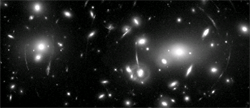Looking back
 a team of researchers at the State University of New York ( suny) , Stony Brook have announced the discovery of a galaxy which is the farthest object known to us. The galaxy is so far that the light we are seeing from it started when the universe was only about 5 per cent of its present age of 15 billion years!
a team of researchers at the State University of New York ( suny) , Stony Brook have announced the discovery of a galaxy which is the farthest object known to us. The galaxy is so far that the light we are seeing from it started when the universe was only about 5 per cent of its present age of 15 billion years!
The universe as we see it now is expanding and all objects are travelling away from all others. The further the object, the faster it is receding from us. This expansion of the universe has an effect on the light which arrives on earth from distant objects. Much like the decrease in the pitch of the siren of an ambulance going away from us, the light also gets stretched towards the red part of the spectrum because of the expansion. This phenomenon is known as redshift. The larger the redshift of an object, the further it is from us. And because the speed of light is finite, when we see light from a distant object, we are actually looking back in time.
The researchers led by H Chen have identified a galaxy at a redshift of 6.68. Using the Hubble Space Telescope's Imaging Spectrograph, they managed to see a unique feature of these far away objects. They observed a particular spectral line (lines given out at characteristic wavelengths by elements) of hydrogen which is in the ultraviolet region and is given off by newly formed stars interacting with the gas cloud enveloping the galaxy. The ultraviolet line gets redshifted to the longer infrared wavelengths by the expansion of the universe.
The record for the farthest object known to us is continually being broken. Before the present discovery, the record holder was a galaxy at a distance when the universe was 6 per cent of its present age. By studying these galaxies at these distances, we can test and refine our theories of star formation and even galaxy formation. With the advance of instrumentation on telescopes, it is expected that we will be seeing a lot more of these very distant objects in the near future.
Related Content
- Energy security and the green transition
- The order of the National Green Tribunal regarding setting up of a ethanol plant at village Banana, cuttack district, Odisha, 12/06/2023
- Report filed by the Principal Chief Conservator of Forests, Punjab on illegal axing of trees in Ludhiana, 01/06/2023
- Powering social infrastructure in Sierra Leone: market assessment and roadmap for health facilities
- Powering social infrastructure in Sierra Leone: market assessment and roadmap for Schools
- Key indicators for Asia and the Pacific 2022
